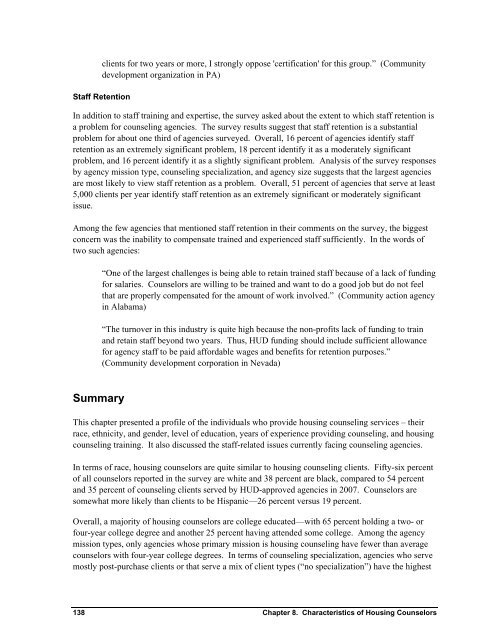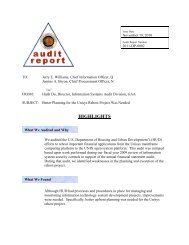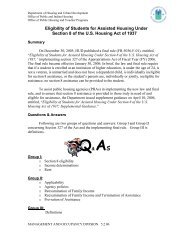Housing Counseling Process Evaluation and Design of ... - HUD User
Housing Counseling Process Evaluation and Design of ... - HUD User
Housing Counseling Process Evaluation and Design of ... - HUD User
You also want an ePaper? Increase the reach of your titles
YUMPU automatically turns print PDFs into web optimized ePapers that Google loves.
clients for two years or more, I strongly oppose 'certification' for this group.” (Community<br />
development organization in PA)<br />
Staff Retention<br />
In addition to staff training <strong>and</strong> expertise, the survey asked about the extent to which staff retention is<br />
a problem for counseling agencies. The survey results suggest that staff retention is a substantial<br />
problem for about one third <strong>of</strong> agencies surveyed. Overall, 16 percent <strong>of</strong> agencies identify staff<br />
retention as an extremely significant problem, 18 percent identify it as a moderately significant<br />
problem, <strong>and</strong> 16 percent identify it as a slightly significant problem. Analysis <strong>of</strong> the survey responses<br />
by agency mission type, counseling specialization, <strong>and</strong> agency size suggests that the largest agencies<br />
are most likely to view staff retention as a problem. Overall, 51 percent <strong>of</strong> agencies that serve at least<br />
5,000 clients per year identify staff retention as an extremely significant or moderately significant<br />
issue.<br />
Among the few agencies that mentioned staff retention in their comments on the survey, the biggest<br />
concern was the inability to compensate trained <strong>and</strong> experienced staff sufficiently. In the words <strong>of</strong><br />
two such agencies:<br />
“One <strong>of</strong> the largest challenges is being able to retain trained staff because <strong>of</strong> a lack <strong>of</strong> funding<br />
for salaries. Counselors are willing to be trained <strong>and</strong> want to do a good job but do not feel<br />
that are properly compensated for the amount <strong>of</strong> work involved.” (Community action agency<br />
in Alabama)<br />
“The turnover in this industry is quite high because the non-pr<strong>of</strong>its lack <strong>of</strong> funding to train<br />
<strong>and</strong> retain staff beyond two years. Thus, <strong>HUD</strong> funding should include sufficient allowance<br />
for agency staff to be paid affordable wages <strong>and</strong> benefits for retention purposes.”<br />
(Community development corporation in Nevada)<br />
Summary<br />
This chapter presented a pr<strong>of</strong>ile <strong>of</strong> the individuals who provide housing counseling services – their<br />
race, ethnicity, <strong>and</strong> gender, level <strong>of</strong> education, years <strong>of</strong> experience providing counseling, <strong>and</strong> housing<br />
counseling training. It also discussed the staff-related issues currently facing counseling agencies.<br />
In terms <strong>of</strong> race, housing counselors are quite similar to housing counseling clients. Fifty-six percent<br />
<strong>of</strong> all counselors reported in the survey are white <strong>and</strong> 38 percent are black, compared to 54 percent<br />
<strong>and</strong> 35 percent <strong>of</strong> counseling clients served by <strong>HUD</strong>-approved agencies in 2007. Counselors are<br />
somewhat more likely than clients to be Hispanic—26 percent versus 19 percent.<br />
Overall, a majority <strong>of</strong> housing counselors are college educated—with 65 percent holding a two- or<br />
four-year college degree <strong>and</strong> another 25 percent having attended some college. Among the agency<br />
mission types, only agencies whose primary mission is housing counseling have fewer than average<br />
counselors with four-year college degrees. In terms <strong>of</strong> counseling specialization, agencies who serve<br />
mostly post-purchase clients or that serve a mix <strong>of</strong> client types (“no specialization”) have the highest<br />
138<br />
Chapter 8. Characteristics <strong>of</strong> <strong>Housing</strong> Counselors
















